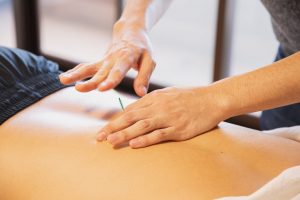Acupuncture for Psoriasis
By Dr. Lei Wang

Psoriasis is a chronic, recurrent inflammatory skin disease that presents as discrete bright red macules, papules or patches covered with lamellated silvery scales.1 Psoriasis can be classified as plaque, guttate, pustular or erythrodermic.2 Psoriasis affects males and females equally, and usually occurs in the second-to-fourth decade of life.3 It affects approximately 1–3% of individuals worldwide.4 The prevalence has been estimated to be 1.5% in the UK,5 and it affects 7.5 million patients in the USA.6 Recent data have shown that the prevalence of psoriasis in China has increased from 0.35% in 19847 to 0.47% in 2012.8
Psoriasis causes considerable psychosocial disability and has a major impact on the quality of life of sufferers.9 Patients with a diagnosis of psoriasis may also have an increased risk of psoriatic arthritis, obesity, dyslipidemia, hypertension, diabetes mellitus and cardiovascular disease (eg, myocardial infarction, stroke).10 Thus, the cost of psoriasis to patients and healthcare systems is high.11
Psoriasis is regarded as an immune-mediated disease in which genetic and environmental factors have significant roles.5 Psoriasis is most often chronic or can recur intermittently, so long-term therapy is required.1 Conventional systemic therapy (eg, methotrexate, cyclosporine, acitretin, photochemotherapy) and biological agents (eg, efalizumab, etanercept, infliximab, adalimumab)12 can result in only temporary remission of the physical symptoms of psoriasis. Moreover, most patients are dissatisfied with treatment because of the side effects and potential cumulative toxicity of these drugs, as well as the comorbidities associated with the disease (eg, dyslipidemia);13 hence, there is a demand for more effective therapies.14
Acupuncture is an important component of Traditional Chinese Medicine. In recent years, it has been used widely for psoriasis in clinical trials.15 A recent study showed that acupuncture can alleviate erythema, scales and the local thickening of maculae in some patients.16 In pre-retrieval of eight electronic databases, we found more than 17 randomised controlled trials (RCTs) of acupuncture for treating psoriasis.
Studies evaluating any type of acupuncture therapy (body acupuncture, auricular acupuncture, electroacupuncture, fire needling, warm needling, catgut embedding, pricking-cupping, slide-cupping) will be included in the review, regardless of the duration and frequency of treatment.
Control interventions could be ‘no treatment’, ‘placebo acupuncture’ (where a needle is attached to the skin surface, does not penetrate the skin, but is placed at the same acupoints as for actual acupuncture treatment), ‘sham acupuncture’ (non-point acupuncture, ie, ‘minimal acupuncture’) or ‘drug therapy’.
Studies with the following comparisons will be included: (1) acupuncture alone versus no treatment (if available), placebo or sham treatment; (2) acupuncture adjunctive to drug therapy versus the same drug therapy alone; (3) acupuncture adjunctive to other treatment versus placebo or sham treatment adjunctive to other treatment.
We will exclude trials comparing only different forms of acupuncture, and those comparing acupuncture with drug therapy, as these studies cannot be used to detail the net effect of acupuncture or show if acupuncture is efficacious.
Use of complementary and alternative medicines is common among people with skin diseases, especially those with psoriasis.22 Acupuncture has been used for psoriasis treatment in China23 and the developed countries.24 Some studies have suggested that acupuncture is an effective therapy for psoriasis.
